Japanese Personnel at International OrganizationsNote 1 Playing Active Roles on the Front Lines across the World
– From the Field of Support for Refugees and Displaced Persons –
ARAKAKI Shoko
Humanitarian Response Division Director, United Nations Population Fund (UNFPA)
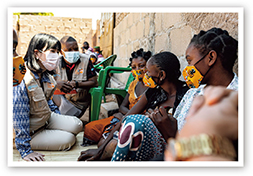
The author (on the left) listening to the people living in a camp for internally displaced persons in Mozambique (Photo: UNFPA)
I am based in Geneva and serve as the first Director of the UNFPA Humanitarian Response Division, which was newly established in July 2019. UNFPA works to provide access to a wide range of sexual and reproductive healthNote 2 and gender-based violence protection services to women, girls, and young people in more than 150 countries. The Humanitarian Response Division focuses on approximately 60 countries facing humanitarian crises. In emergencies caused by natural disasters or conflicts, we oversee the deployment of personnel and relief supplies, including the dispatch of emergency response teams to transport supplies. In November 2023, during the pause in fighting in the Gaza Strip, Palestine, we were in charge of logistic support for transporting relief supplies and ensuring stockpiles.
As a Division Director, I regularly visit humanitarian countries including refugee and internally displaced persons (IDP) camps to gain a good grasp of the actual situation on the ground and to be able to provide more tailored humanitarian assistance. This year, I visited refugee and IDP camps in Kenya and Ethiopia, where I observed sports activities for refugees with disabilities and the deployment of mobile clinics supported by the Government of Japan. Through these visits, I genuinely felt that the efforts to promote “human security” were recognized and appreciated by the local people.
UNFPA sets the transformative goal of ending preventable maternal death and gender-based violence by 2030, much of which occurs amid humanitarian crises. In collaboration with other international organizations, partner organizations, and donor countries, including Japan, UNFPA will continue to deliver humanitarian assistance and advocate the specific needs of women and girls in humanitarian emergencies.
YAMAMOTO Yuichiro
Child Protection Specialist, United Nations Children’s Fund (UNICEF) Afghanistan Country Office
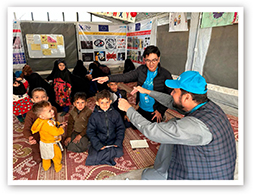
The author (second from the right) interacting with returnee children at a “Child Friendly Space” set up by the border point between Afghanistan and Pakistan (Photo: UNICEF)
In Afghanistan, after the Taliban announced the formation of a “transitional government” in August 2021, humanitarian needs have become unprecedentedly high due to rapid economic decline, collapse of the national social service systems, recurring natural disasters, and the exclusion of women and girls from public life. Following the end of fighting between the Government of Afghanistan and the Taliban, Afghans who had taken refuge in neighboring countries such as Iran and Pakistan have returned to their home country, but many of them face the same or even worse hardships and conditions that had prompted their initial migration.
I was assigned to the UNICEF Afghanistan Country Office in 2022. In order to ensure that all children in Afghanistan are protected from violence, abuse, and exploitation, one of my responsibilities is to work with the Taliban’s “transitional government” to strengthen the child protection system in the country. As part of our efforts, I coordinate the recruitment, training, and deployment of social workers who identify and respond to cases of child rights violations across the country. Since 2022, with financial contributions from Japan, UNICEF has been providing psychosocial and social support to vulnerable children in addition to referrals to much-needed services such as education and health. We also provide opportunities for vocational training and income generating activities to support their reintegration into society. Regarding the support for unaccompanied and separated children who have returned from neighboring countries, we help them reunite with their families and facilitate their transfer to their location of origin.
ITO Tsuneko
Reporting Liaison Officer, United Nations Office for Project Services (UNOPS) Multi-Country Office in Amman
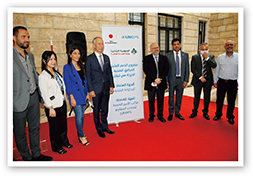
Handover ceremony at Baabda Governmental Hospital in Lebanon (the author is second from the left) (Photo: Ministry of Public Health of Lebanon)
Lebanon is said to be the country that hosts the largest number of refugees per capita in the world,Note 3 with approximately a quarter of the population being refugees. The sharp increase in the refugee population since the onset of the Syrian civil war in 2011 has put pressure on the provision of basic public services, particularly in the health sector. In addition to the chronic shortage and aging of medical devices, the daily power outages caused by the economic crisis, soaring fuel prices, and supply shortages have been affecting even the operation of emergency lifesaving medical equipment at health facilities.
With funding from the Government of Japan, since 2021, UNOPS has supported strengthening the strained health system by providing medical equipment and installing solar panels in critical public hospitals that serve vulnerable Lebanese populations living in difficult situations as well as refugees.
Since 2020, in the UNOPS Multi-Country Office, which covers the Middle East region, including Lebanon, I have been coordinating partnerships development and supporting project implementation leveraging the UNOPS’ expertise in procurement, infrastructure, and project management. To serve as a bridge between people in need of assistance and donor organizations, together with colleagues, I am working to deliver sustainable support that promotes the Humanitarian-Development-Peace Nexus. Such endeavors include incorporating responses to medium- to long-term development challenges into humanitarian assistance that benefits both host communities and refugees, shown in the instance of introduction of renewable energy solutions addressing climate change.
KOBAYAKAWA Akiko
Head of Programme, United Nations Office for Project Services (UNOPS) Myanmar Country Office
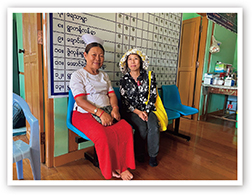
The author (on the right) visiting the clinic UNOPS supported, with the clinic midwife (Photo: UNOPS)
I have been working for UNOPS since 2000 and have been responsible for resource mobilization and project implementation for mine action and infrastructure works in conflict-affected countries. Mines, explosive remnants of war, and improvised explosive devices impede the return of refugees and displaced persons, further reconstruction and development, and the consolidation of peace. Many people became victims of unexploded ordnance (UXOs). For example, children often mistake them for a toy, and others try to scrap the metals for money when the ordnance explodes. Therefore, comprehensive mine action is imperative, covering risk education, clearance and victim assistance. I previously worked for the United Nations Mine Action Service (UNMAS)/UNOPS Syria Office. After three years of negotiations with the government, we were able to start the demining of agricultural land in the outskirts of the capital, which leads to farmers returning to farming.
Myanmar, where I took up my current post in May 2022, is still in the midst of ongoing conflict. Approximately 2 million people, equating to approximately 4% of the country’s 55 million population, have become IDPs and are living in dire situations. With funding from the Government of Japan, UNOPS provides essential items such as hygiene products, water buckets, and mosquito nets in the IDP camps of tropical regions where many ethnic minorities live. Solar lanterns, also provided by UNOPS, allow people to charge mobile phones and study at home, in addition to enabling protection, as they allow women and children to use the toilets safely at night. We also installed solar panels at the health clinics, supporting continuous patients’ visits and consultations, and caring for pregnant women and nursing mothers, even when there is no electricity. In Myanmar, humanitarian mine action is also an imminent priority but activities are currently limited to mine risk education. We are carefully continuing joint efforts to start mine clearance activities in the future ahead.
AKAO Kunikazu
Head of Sub-Office (Shire, Tigray Region) and Durable Solution Manager, International Organization for Migration (IOM) Ethiopia Country Office
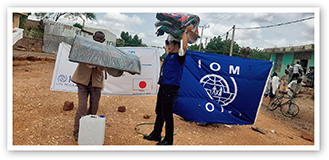
The author (on the right) handing over relief supplies from Japan in Tigray Region (Photo: IOM)
I joined the IOM Ethiopia in 2021. After engaging in projects to support refugees from South Sudan and border management initiatives, since February 2022, I have served as the Head of the IOM Shire Sub-Office in the Tigray Region located in northern Ethiopia. The Tigray Region was under two-year-long armed clashes between the Federal Government of Ethiopia and the Tigray People’s Liberation Front (TPLF), which started in 2020. As an official in charge of this region, I was responsible for securing shelter and providing daily necessities and other necessary services, such as water and health, to IDPs, with support from the Government of Japan and other donors. In August 2022, when the town of Shire, my duty station, became the scene of an armed clash, I stayed in Shire to ensure that humanitarian assistance could continue while protecting the safety of our office staff through coordinating with the military and police of the federal government in the region.
With the signing of the peace agreement in November 2022, a certain degree of stability returned to the region. Following this situation, IOM has shifted its focus from emergency assistance to reconstruction and peacebuilding support. In addition to working as the Head of the Sub-Office, I also belong to the IOM’s Peace and Development Coordination Unit where I am responsible for a support program called “Durable Solutions.” This program supports IDPs in rebuilding their lives over the medium- to long-term by providing them with different types of durable solutions depending on their situation, such as assisted return to their places of origin, local integration, or settlement in a third location.
- Note 1: Contributed by personnel at international organizations. Titles of individuals are as of the writing of the articles.
- Note 2: A state of not only being free of disease or disability but also being in complete physical, mental, and social well-being in all matters related to sexuality and reproduction.
- Note 3: United Nations High Commissioner for Refugees (UNHCR) “Global Trends Report 2022” https://www.unhcr.org/global-trends-report-2022
